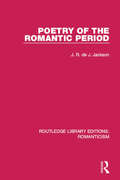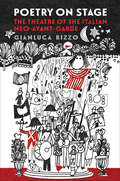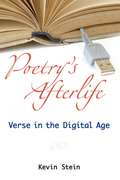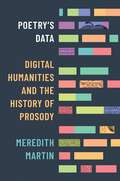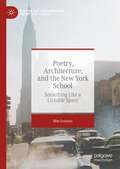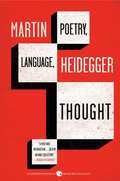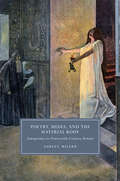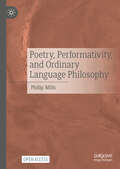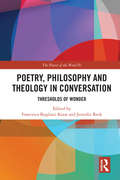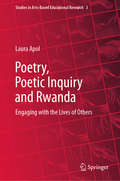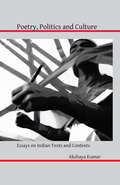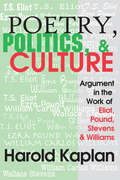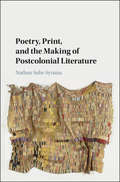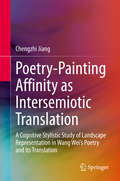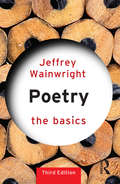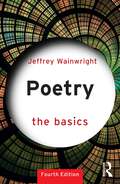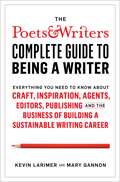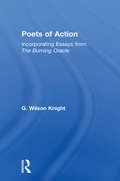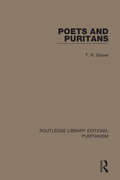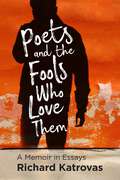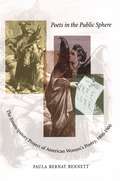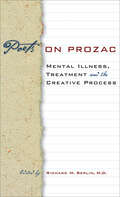- Table View
- List View
Poetry of the Romantic Period (Routledge Library Editions: Romanticism #18)
by J. R. JacksonFirst published in 1980. This title provides a critical and historical account of poetry written between 1780 and 1835. The author has been especially concerned to place the great poems and poets of the age in the context of the conventions and traditions in which they wrote, offering new perspectives on familiar works. Poems still famous are examined often in relation to works of a similar kind fashionable at the time but now neglected, and these unconventional groupings throw fresh light on Romantic poetry as a whole. An appendix is included, designed to be read as a supplement to the main text, serving both as a chronology and as a brief guide to works that do not fall within the scope of the main argument. This title will be of interest to students of literature.
Poetry on Stage: The Theatre of the Italian Neo-Avant-Garde (Toronto Italian Studies)
by Gianluca RizzoPoetry on Stage focuses on exchanges between the writers of the Italian neo-avant-garde with the actors, directors, and playwrights of the Nuovo Teatro. The book sheds light on a forgotten chapter of twentieth-century Italian literature, arguing that the theatre was the ideal incubator for stylistic and linguistic experiments and a means through which authors could establish direct contact with their audience and verify solutions to the practical and theoretical problems raised by their stances in politics and poetics. A robust analysis of a number of exemplary texts grounds these issues in the plays and poems produced at the time and connects them with the experimentations subsequently carried out by some of the same artists. In-depth interviews with four of the most influential figures in the field – critic Valentina Valentini, actor and director Pippo Di Marca, author Giuliano Scabia, and the late poet Nanni Balestrini – conclude the volume, providing invaluable first-hand testimony that brings to life the people and controversies discussed.
Poetry's Afterlife: Verse in the Digital Age
by Kevin SteinAt a time when most commentators fixate on American poetry's supposed "death," Kevin Stein's Poetry's Afterlife instead proposes the vitality of its aesthetic hereafter. The essays of Poetry's Afterlife blend memoir, scholarship, and personal essay to survey the current poetry scene, trace how we arrived here, and suggest where poetry is headed in our increasingly digital culture. The result is a book both fetchingly insightful and accessible. Poetry's spirited afterlife has come despite, or perhaps because of, two decades of commentary diagnosing American poetry as moribund if not already deceased. With his 2003 appointment as Illinois Poet Laureate and his forays into public libraries and schools, Stein has discovered that poetry has not given up its literary ghost. For a fated art supposedly pushing up aesthetic daisies, poetry these days is up and about in the streets, schools, and universities, and online in new and compelling digital forms. It flourishes among the people in a lively if curious underground existence largely overlooked by national media. It's this second life, or better, Poetry's Afterlife, that his book examines and celebrates. Kevin Stein is Caterpillar Professor of English and Director of the Creative Writing Program at Bradley University and has served as Illinois Poet Laureate since 2003, having assumed the position formerly held by Gwendolyn Brooks and Carl Sandburg. He is the author of numerous books of poetry and criticism.
Poetry's Data: Digital Humanities and the History of Prosody
by Meredith MartinWhy literary studies must confront digital mediationWe live and research in a technologically mediated landscape in which old models of reading and researching—methods that presume an autonomous, single scholar gathering resources and making claims—no longer hold. Scholars have yet to theorize either the embeddedness of their sources inside multiple layers of mediation or their own place in an information ecosystem that demands our active participation. In Poetry&’s Data, Meredith Martin explores what current access to data might mean for mapping the discourse of poems. Martin&’s account of her work learning about digital humanities so that she could build a database of historic prosodic materials becomes a through line in a narrative that chronicles how literature has understood poetry&’s data—its sounds—from the sixteenth century to the present day.Digital knowledge infrastructures have historical antecedents that scholars have been trained to theorize. And yet, as Martin points out, we have not been trained to identify and navigate, let alone critique, the current landscape of knowledge production. Through five chapters and five examples from the Princeton Prosody Archive, Martin shows that the histories of mediation and format are essential to the teaching of poetry and poetic form.
Poetry, Architecture, and the New York School: Something Like a Liveable Space (Modern and Contemporary Poetry and Poetics)
by Mae LosassoPoetry, Architecture, and the New York School: Something Like a Liveable Space examines the relationship between poetics and architecture in the work of the first generation New York School poets, Frank O’Hara, John Ashbery, Barbara Guest, and James Schuyler. Reappraising the much-debated New York School label, Mae Losasso shows how these writers constructed poetic spaces, structures, surfaces, and apertures, and sought to figure themselves and their readers in relation to these architextual sites. In doing so, Losasso reveals how the built environment shapes the poetic imagination and how, in turn, poetry alters the way we read and inhabit architectural space. Animated by archival research and architectural photographs, Poetry, Architecture, and the New York School marks a decisive interdisciplinary turn in New York School studies, and offers new frameworks for thinking about postmodern American poetry in the twenty-first century.
Poetry, Language, Thought (Harper Perennial Modern Thought Ser.)
by Martin HeideggerPoetry, Language, Thought collects Martin Heidegger's pivotal writings on art, its role in human life and culture, and its relationship to thinking and truth. Essential reading for students and anyone interested in the great philosophers, this book opens up appreciation of Heidegger beyond the study of philosophy to the reaches of poetry and our fundamental relationship to the world. Featuring "The Origin of the Work of Art," a milestone in Heidegger's canon, this enduring volume provides potent, accessible entry to one of the most brilliant thinkers of modern times.
Poetry, Media, and the Material Body: Autopoetics in Nineteenth-Century Britain (Cambridge Studies in Nineteenth-Century Literature and Culture #113)
by Ashley MillerFrom the Romantic fascination with hallucinatory poetics to the turn-of-the-century mania for automatic writing, poetry in nineteenth-century Britain appears at crucial times to be oddly involuntary, out of the control of its producers and receivers alike. This elegant study addresses the question of how people understood those forms of written creativity that seem to occur independently of the writer's will. Through the study of the century's media revolution, evolving theories of physiology, and close readings of the works of nineteenth-century poets including Wordsworth, Coleridge and Tennyson, Ashley Miller articulates how poetry was imagined to promote involuntary bodily responses in both authors and readers, and how these responses enlist the body as a medium that does not produce poetry but rather reproduces it. This is a poetics that draws attention to, rather than effaces, the mediacy of the body in the processes of composition and reception.
Poetry, Performativity, and Ordinary Language Philosophy
by Philip MillsHow can Ordinary Language Philosophy (OLP) help us understand poetry? Against John L. Austin’s exclusion of poetic utterances as parasitical, Philip Mills explores how contemporary poetics broadens the aims and scope of OLP. Through the analysis of French and American poetry that reinterprets notions such as illocution, perlocution, and language-games, Mills develops a poetic philosophy of language, revealing its viral and transformative nature. Poetry, Performativity, and Ordinary Language Philosophy bridges philosophy and poetry, showing how poetry contaminates and reshapes our ways of thinking and being in the world, and combining the poetic and the ethical in the notion of ‘poethics.’ This Open Access book offers a new perspective on the poetic and literary potential of OLP and the intersections between the philosophy of language and poetry.
Poetry, Philosophy and Theology in Conversation: Thresholds of Wonder: The Power of the Word IV
by Jennifer Reek Francesca Bugliani KnoxThis volume is a collection of essays that explains how literature, philosophy and theology have explored the role of wonder in our lives, particularly through poetry. Wonder has been an object of fascination for these disciplines from the Greek antiquity onwards, yet the connections between their views on the subject are often ignored in subject specific studies. The book is divided into three parts: Part I opens the conversation on wonder in philosophy, Part II is given to theology and Part III to literary perspectives. An international set of contributors, including poets as well as scholars, have produced a study that looks beyond traditional chronological, geographical and disciplinary boundaries, both within the individual essays themselves and in respect to one another. The volume’s wide historical framework is punctuated by four poems by contemporary poets on the theme of wonder. An unconventional foray into one of the best-known themes of the European tradition, this book will be of great interest to scholars of literature, theology and philosophy.
Poetry, Physics, and Painting in Twentieth-Century Spain
by Candelas GalaThis book reads the work of Salinas, Guill#65533;n, Larrea, Diego, Alberti, M#65533;ndez, and Lorca in analogical relation with Cubism and with the revolutionary discoveries of modern physics. Gala advances traditional criticism by considering these artists in the broader cultural context of Spain, Europe, and European Modernism.
Poetry, Poetic Inquiry and Rwanda: Engaging with the Lives of Others (Studies in Arts-Based Educational Research #3)
by Laura ApolThis book describes the practice of poetic inquiry and takes the reader through the process of translating lived experience into poetry that attends to the lives of others. Using her own writing—from early drafts to published poems—Apol demonstrates elements of poetic inquiry that both give it strength and make it complicated: the importance of craft (the aesthetic); the imperative of accuracy and reliability (the investigative); the significance of ethical responsibility that leads to action (witness); and the centrality of relational connectedness and accountability (withness). Apol raises questions about what it means for poems to function as both research and art, and illustrates what happens when there are irresolvable conflicts between the demands of the poem and a commitment to relationship. Throughout, Apol addresses her white privilege, as well as the dominant white/colonial narrative that often seeps into arts-based work unless it is overtly and critically addressed. The book goes beyond arts-based research, speaking as well to other forms of cross-national, cross-cultural research. It is a call for relational scholarship that moves toward action, a heart-rending teaching, a post-traumatic aesthetic map laid down with clear and poignant theory and praxis to extend, serve and guide.
Poetry, Politics and Culture: Essays on Indian Texts and Contexts
by Akshaya KumarThis book maps the journey of the Indian poetic imagination—in Hindi, Panjabi and Indian English—from its original quasi-spiritual longings to its activist interventions in the public domain. As Indian poetry of the post-1990s gravitates towards a non-Orientalised postcolonial nationalism, it seeks to rewrite and disseminate the shifting coordinates of nationalist imagination in terms of the dissent of the subaltern discontents of the nation. The book is interdisciplinary: it studies Indian poetry from the new emerging imperatives of postcolonialism, new historiography (subaltern, dalit and diasporas), nationalism, and cultural studies. Covering the two major north Indian languages—Hindi and Punjabi—along with poetry in Indian English, the book is a close textual study of about 150 poetry collections in these languages. It is path-breaking in its study of secular poetry written in the so-called vernaculars, with critical attention to its participation in the political as well as cultural processes of nation-making. This cutting-edge book should be of interest to scholars of Indian writings in English, Hindi and Panjabi, gender studies, dalit and diaspora studies, postcolonial poetry and to students reading South Asian literature and culture.
Poetry, Politics, and Culture: Argument in the Work of Eliot, Pound, Stevens, and Williams
by Harold KaplanA salient feature of modern poetics is its direct connection with cultural history and politics. Among the great American poets of the twentieth century, Wallace Stevens and William Carlos Williams offer a significant contrast with T. S. Eliot and Ezra Pound. Where the latter advocated a theocentric or reactionary response to the cultural crises of modernity, the former affirmed an essentially humanist and democratic social and aesthetic ethos. In Poetry, Politics, and Culture, Harold Kaplan offers a penetrating comparative study of these representative and distinctively influential poets.All four poets wrote in an atmosphere of cultural crisis following World War I, caught as they were between outmoded belief systems and various forms of artistic and political nihilism. While each believed in poetry as a source of cultural values and beliefs, they nevertheless experienced loss of confidence in their own vocation in a world characterized by scientific, rationalist thinking and the mundane struggle for survival. For each, therefore, the poetic imagination was a means of restoring order, or building a new civilization out of chaos. In trying to define a revitalized culture, the four exemplified the perennial quarrel between Europe and America.
Poetry, Print, and the Making of Postcolonial Literature
by Nathan Suhr-SytsmaPoetry, Print, and the Making of Postcolonial Literature reveals an intriguing history of relationships among poets and editors from Ireland and Nigeria, as well as Britain and the Caribbean, during the mid-twentieth-century era of decolonization. The book explores what such leading anglophone poets as Seamus Heaney, Christopher Okigbo, and Derek Walcott had in common: 'peripheral' origins and a desire to address transnational publics without expatriating themselves. The book reconstructs how they gained the imprimatur of both local and London-based cultural institutions. It shows, furthermore, how political crises challenged them to reconsider their poetry's publics. Making substantial use of unpublished archival material, Nathan Suhr-Sytsma examines poems in print, often the pages on which they first appeared, in order to chart the transformation of the anglophone literary world. He argues that these poets' achievements cannot be extricated from the transnational networks through which their poems circulated - and which they in turn remade.
Poetry-Painting Affinity as Intersemiotic Translation: A Cognitive Stylistic Study of Landscape Representation in Wang Wei’s Poetry and its Translation
by Chengzhi JiangThis book interprets the close intimacy between poetry and painting from the perspective of intersemiotic translation, by providing a systematic examination of the bilingual and visual representation of landscape in the poetry of Wang Wei, a high Tang poet who won worldwide reputation. The author’s subtle analysis ranges from epistemological issues of language philosophy and poetry translation to the very depths where the later Heidegger and Tao-oriented Chinese wisdom can co-work to reveal their ontological inter-rootedness through a two-level cognitive-stylisitc research methodology.
Poetry: The Basics (The Basics)
by Jeffrey WainwrightNow in its third edition Poetry: The Basics remains an engaging exploration of the world of poetry. Drawing on examples ranging from Chaucer to children's rhymes, Cole Porter to Carol Ann Duffy, and from around the English-speaking world, it shows how any reader can understand and gain more pleasure from poetry. Exploring poetry’s relationship to everyday language and introducing major genres and technical aspects in an accessible way, it is a clear introduction to how different types of poetry work through the study of details and of whole poems. With a revised chapter on the different practices and ideas in the writing of poetry now, including sections on film poetry and digital poetics, this is a must read for all students of English Literature.
Poetry: The Basics (The Basics)
by Jeffrey WainwrightNow in its fourth edition, Poetry: The Basics remains an engaging exploration of the exciting and diverse world of poetry. Jeffrey Wainwright’s accessible introduction demystifies poetic forms and traditions, which can at first seem bewildering.Drawing on examples ranging from Chaucer to children's rhymes, Cole Porter to Dylan Thomas, and from around the English-speaking world, it shows how any reader can understand and gain pleasure from poetry. This comprehensive guide explores poetry’s relationship to everyday language and introduces major genres and technical aspects. Each chapter proceeds through chronological examples from a wide range of English language poems. They cover all the major genres with informative studies of metre, rhyme, and stanza, showing how these features have developed through traditional to contemporary forms like rap. The book also features an exhaustive glossary to help imbed these technical terms and approaches.This clear and concise guide offers detailed insight into the nuts and bolts of poetry, as well as exploring its ability to inspire. It is a must-read for anyone interested in the art of poetry, whether as a reader, writer, or student.
Poets & Writers Complete Guide to Being A Writer
by Kevin Larimer Mary GannonFor half a century, writers at every stage of their careers have turned to the literary nonprofit organization Poets & Writers for help with their professional development. In this book Poets & Writers provides the authoritative guide for writers that answers every imaginable question about craft and career. From kickstarting your creativity and developing your style to getting your work read and published, this is the bible for authors of all genres and forms.Written by Kevin Larimer and Mary Gannon, the two most recent editors of Poets & Writers Magazine, this book brings an unrivaled understanding of the areas in which writers seek guidance and support. Filled with insider information like sample query letters, pitch letters, lists of resources, and worksheets for calculating freelance rates, tracking submissions, and managing your taxes, the guide does more than demystify the writing life-it also provides an array of powerful tools for building a sustainable career as a writer. In addition to the wealth of insights into creativity, publishing, and promotion are first-person essays from bestselling authors, including George Saunders, Christina Baker Kline, and Ocean Vuong, as well as reading lists from award-winning writers such as Anthony Doerr, Cheryl Strayed, and Natalie Diaz. Here, at last, is the ultimate comprehensive resource that belongs on every writer's desk
Poets Of Action - Wilson Knight: Incorporating Essays from The Burning Oracle
by Wilson KnightFirst Published in 2002. Routledge is an imprint of Taylor & Francis, an informa company.
Poets Of Reality: Six Twentieth-Century Writers
by J. Hillis MillerPassages from six twentieth century authors: Joseph Conrad, W.B. Yeats, T. S. Eliot, Dylan Thomas, Wallace Stevens, William Carlos Williams
Poets and Puritans
by T. R. GloverOriginally published in 1915, the essays in this book deal with 9 English writers – as diverse in outlook and temperament as Bunyan and Boswell; poets and Puritans and men who were neither. The book examines each writer in his historical and social context – facing problems in art or religion and life in general.
Poets and the Fools Who Love Them: A Memoir in Essays
by Richard KatrovasPoets and the Fools Who Love Them blends autobiography with cultural commentary and meditates on creative writing as a cottage industry within humanities higher education. Celebrated poet and memoirist Richard Katrovas examines his picaresque early years with a criminal father, a beleaguered mother, and four siblings as state and federal authorities pursued the family across the highways of America. His freewheeling, wide-ranging essays consider, among other social constructs, the relation of crime and art, and the relation of both to the authority of the state, particularly in terms of race and class. Katrovas speaks candidly about how white privilege facilitated his father’s criminal career, as a lifestyle of larceny and used-car scams, perpetuated state to state, would have surely had different implications for a family of color. Drawing on his adulthood in academe, Katrovas’s memoir in essays chronicles a quest to locate surrogate fathers among older poets and other creative writers, and reflects upon the ways in which that search has affected his role as the father to three Czech American daughters. The book flows from the love of a poet for other poets, for the “community of poets,” one likened to a “gang of priests” and a “herd of bears.” Katrovas maintains that most lovers of poets are themselves poets, and those lovers of poets who are not themselves poets are saints.At its heart, Poets and the Fools Who Love Them contemplates, with care and unabashed honesty, the role of art and the artist in the madcap twenty-first century.
Poets in the Public Sphere: The Emancipatory Project of American Women's Poetry, 1800-1900
by Paula Bernat BennettBased entirely on archival research, Poets in the Public Sphere traces the emergence of the "New Woman" by examining poetry published by American women in newspapers and magazines between 1800 and 1900. Using sources like the Kentucky Reporter, the Cherokee Phoenix, the Cincinnati Israelite, and the Atlantic Monthly, Bennett is able to track how U.S. women from every race, class, caste, region, and religion exploited the freedom offered by the nation's periodical press, especially the poetry columns, to engage in heated debate with each other and with men over matters of mutual concern. Far from restricting their poems to the domestic and personal, these women addressed a significant array of political issues--abolition, Indian removals, economic and racial injustice, the Civil War, and, not least, their own changing status as civil subjects. Overflowing with a wealth of heretofore untapped information, their poems demonstrate conclusively that "ordinary" nineteenth-century women were far more influenced by the women's rights movement than historians have allowed. In showing how these women turned the sentimental and ideologically saturated conventions of the period's verse to their own ends, Bennett argues passionately and persuasively for poetry's power as cultural and political discourse. As much women's history as literary history, this book invites readers to rethink not only the role that nineteenth-century women played in their own emancipation but the role that poetry plays in cultural life.
Poets on Prozac: Mental Illness, Treatment and the Creative Process
by Richard M. BerlinIn this collection of 16 essays, poets discuss psychiatric treatment and their work. Poets on Prozac shatters the notion that madness fuels creativity by giving voice to contemporary poets who have battled myriad psychiatric disorders, including depression, schizophrenia, post-traumatic stress disorder, and substance abuse.The sixteen essays collected here address many provocative questions: Does emotional distress inspire great work? Is artistry enhanced or diminished by mental illness? What effect does substance abuse have on esthetic vision? Do psychoactive medications impinge on ingenuity? Can treatment enhance inherent talents, or does relieving emotional pain shut off the creative process?Featuring examples of each contributor’s poetry before, during, and after treatment, this original and thoughtful collection finally puts to rest the idea that a tortured soul is one’s finest muse.Honorable Mention, 2008 PROSE Award for Best Book in Psychology.“A fascinating collection of 16 essays, as insightful as they are compulsively readable. Each is honest and sharply written, covering a range of issues (depression, anxiety, obsessive-compulsive disorder, psychosis, substance abuse or, in acutely deadpan Andrew Hudgins’s case, “tics, twitches, allergies, tooth-grinding, acid reflux, migraines . . . and shingles”) along with treatment methods, incorporating personal anecdotes and excerpts from poems and journals. . . . Anyone affected by mental illness or intrigued by the question of its role in the arts should find this volume absorbing.” —Publishers Weekly“Berlin has done a marvelous job of showing us how ordinary poets are; the selected poets have shown us that mental illness shares with other experiences a capacity to reveal our humanity.” —Metapsychology
Poets on Prozac: Mental Illness, Treatment, and the Creative Process
by Richard M. BerlinHonorable Mention, 2008 PROSE Award for Best Book in Psychology. Professional and Scholarly Publishing Division of the Association of American Publishers.Poets on Prozac shatters the notion that madness fuels creativity by giving voice to contemporary poets who have battled myriad psychiatric disorders, including depression, schizophrenia, post-traumatic stress disorder, and substance abuse.The sixteen essays collected here address many provocative questions: Does emotional distress inspire great work? Is artistry enhanced or diminished by mental illness? What effect does substance abuse have on esthetic vision? Do psychoactive medications impinge on ingenuity? Can treatment enhance inherent talents, or does relieving emotional pain shut off the creative process?Featuring examples of each contributor’s poetry before, during, and after treatment, this original and thoughtful collection finally puts to rest the idea that a tortured soul is one’s finest muse.
